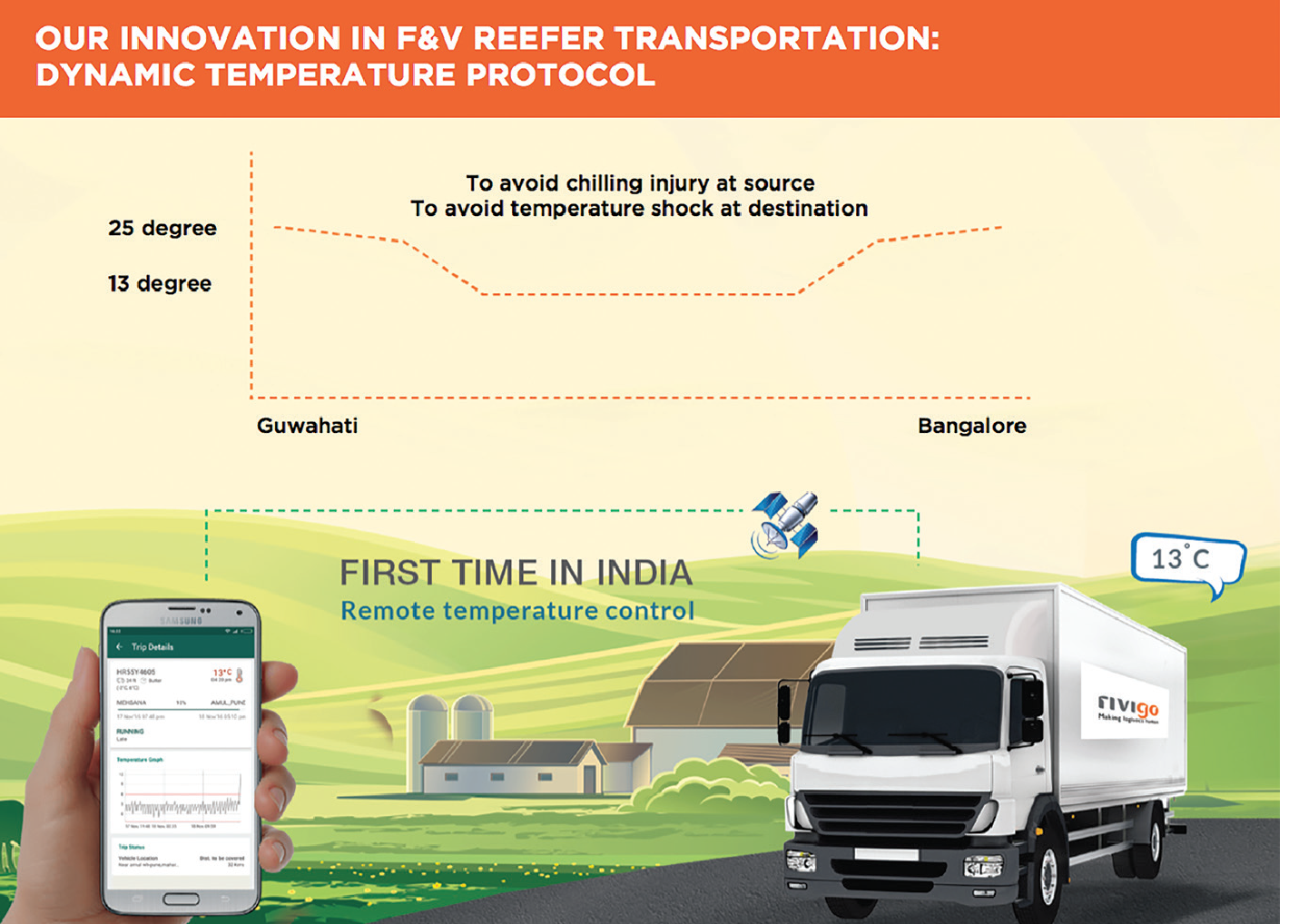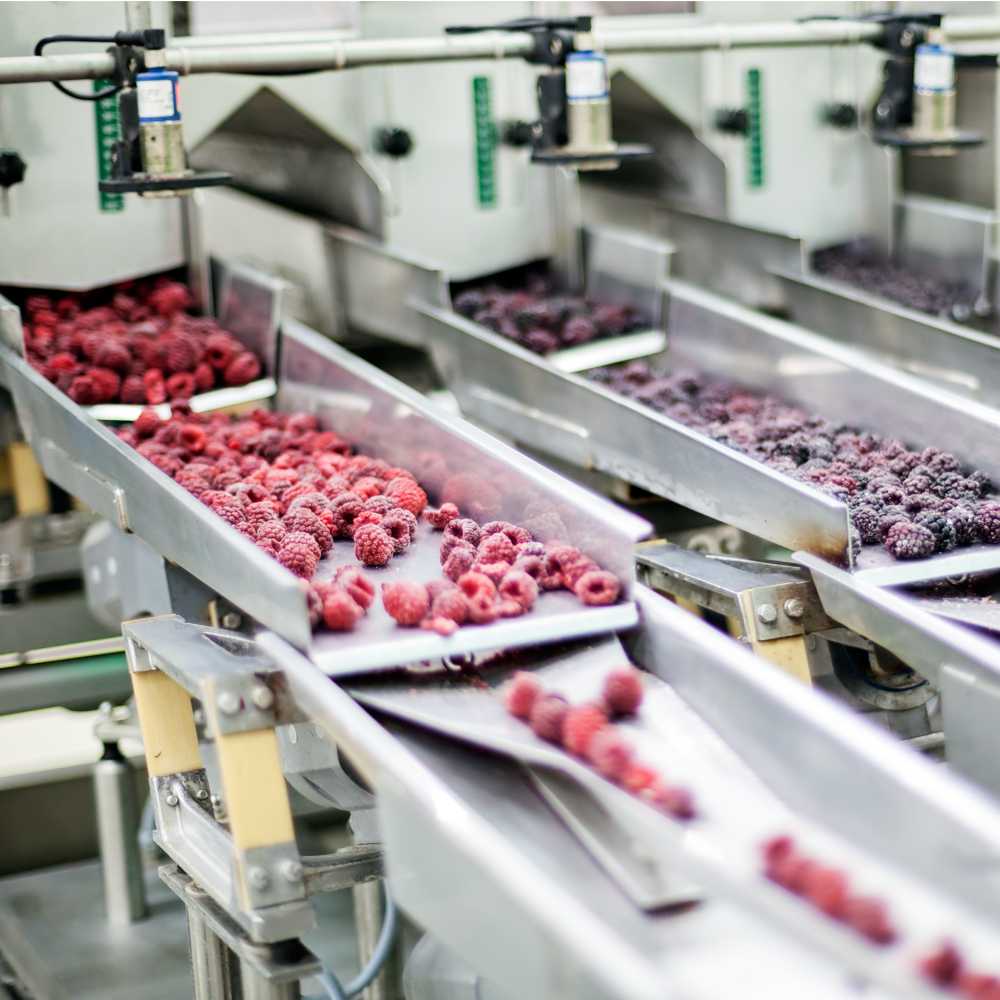In India, only 10,000-12,000 refrigerated trucks are on-road, out of which hardly 1000-2000 are engaged in transporting cold store/imported fruits & vegetable and zero in transportation of fresh Fruits & Vegetables (F&V). There is a significant opportunity to transform the horticulture sector with deployment of unique cold chain logistics model. Sensing the pulse of the market, Rivigo has developed a logistics model to create value in the F&V segment.
Over the years, horticulture has emerged as one of the potential agricultural enterprise in accelerating the growth of economy. Its role in the country's nutritional security, poverty alleviation and employment generation programs is becoming increasingly important. Fruits and vegetables account for nearly 90% of the total horticulture production in the country. India is now the second largest producer of fruits and vegetables in the world and is the leader in several horticultural crops, namely mango, banana, papaya, cashew nut, areca nut, potato, and okra.
At present, horticulture is contributing 24.5% of GDP from 8% land area. On account of significant production increases in horticultural crops across the country, a Golden Revolution is in the offing and India has emerged as a leading player in the global scenario.
Honourable Prime Minister Shri Narendra Modi has a dream – doubling up of farm income by 2021. Innovation in post-harvest management and distinctly agile cold chain transportation would contribute significantly towards fulfillment of that dream. Today, owing to the inefficiencies in supply chain network, around 18-20% of horticultural produce gets wasted. Inefficient supply chain creates three types of challenges:
- Physical wastage – In products like green chillies and tomatoes, 15-20% of the product gets wastage at various stages – at source as well as at destination mandi.
- Value wastage – When farmers do not get the desired price for their produce either due to lack of access to potential markets or due to price volatility. e.g. in HP, 2000T of cherries get produced, which all get dumped in Azadpur Mandi at sub-optimal prices. The actual demand of Delhi NCR would be 1500T. Growers don’t take the risk of sending the produce to distant markets like Chennai, Bengaluru due to high transit time.
- Working capital blockage – When growers/traders have to access distant markets, e,g, Guwahati to Chennai or Himachal to Cochin, 12-15 days of working capital gets blocked, due to the transit time. In a season of 2-3 months, therefore a farmer/trader can rotate money only 4-6 times. That becomes a deterrent for them to send products to distant markets.
In India, only 10,000-12,000 refrigerated trucks are on-road, out of which hardly 1000-2000 are engaged in transporting cold store/imported fruits & vegetable and zero in transportation of fresh F&V. In comparison, roughly 5,00,000 trucks are engaged in transporting perishable long distance. There is significant opportunity to transform the horticulture sector with deployment of unique cold chain logistics model. Rivigo has developed just the right logistics model to create value in the F&V segment.
Rivigo has got 2 unique features in its operating model to serve the F&V segment:
Unique ‘Driver Relay Model’ that reduces transit time by ~50%: Rivigo has successfully developed and deployed at scale the unique ‘Driver Relay Model’ for long distance transportation. In this model, drivers change after every 250- 300km. The drivers change over at our pit-stops and then return to original point by driving back the return cargo, thereby returning home the same day. This has fundamentally altered the driver lifestyle. The benefit of this model is the dramatic improvement in transit time. Vehicles travel 22-23 hours a day due to driver changeover, therefore 800-1000km of travel gets covered per day, 3x that of typical trucks. Delhi to Bengaluru is done in 2.5 days, Delhi-Guwahati in 2.5 days… etc. For perishable transportation, this brings in a unique capability to connect growers to markets that they were not accessing earlier.
Temperature integrity system: In India, there is a lack of trust in temperature integrity of the refrigerated transportation. There are many instances of drivers switching off AC in transit to save fuel cost. In the Rivigo model, since driver changes over every 250- 300km, the risk gets eliminated. In addition, a cutting-edge technology has been deployed to deliver best-in-class temperature integrity. There are 2 parts to it –
- Real-time remote temperature monitoring: All vehicles have GPRS based temperature monitoring system. The proprietary technology sends automated alerts in case of any temperature violation which the 24x7 temperature monitoring team acts upon and co-ordinates with the field team to take immediate action.
- Remote temperature management system: This is an industry first solution called ‘Remote Temperature Management’. Here temperature of the running vehicles can be set/ altered remotely from a mobile App. This provides 2 unique advantages:
- De-risks temperature abuse by drivers completely: A qualified central team would set the temperature remotely of all vehicles.
- Enables graded temperature setting protocol: A unique challenge with F&V handling through reefers is ‘Chill injury’ that happens at the destination point when the products from AC environment (13 degree) are suddenly exposed to ambient temperature. Similarly, water-condensation takes place on the produce (e.g. in tomato, apples, etc.). This is perceived to be of poor quality. The remote temperature management system would eliminate this problem altogether. This system enables changing the temperature of the running vehicle remotely and bring it near ambient 6-10 hours before the destination point, thereby avoiding the risk of chill injury.
Success stories
In refrigerated transportation, Rivigo’s big focus from the beginning has been fresh fruits & vegetable segment. Every month, they transport 3000-4000 MT of fruits & vegetables in refrigerated vehicles, thereby enabling farmers to get higher yield and reduced wastage. Specific example of fresh F&V handling done are:
- Cucumber, green chillies and jack fruits from Guwahati to Delhi: Rivigo is connected with the growers in the Barpeta and Kharupetia area. Earlier they used to sell their excess produce at throw away prices. They got the growers connected to the traders in Azadpur mandi and enabled these fresh produce reach in excellent quality. The biggest success came when growers decided to tap distant south markets like Chennai and Bengaluru. Rivigo demonstrated to the farmers that they can reach these places from Guwahati in 3 days’ time, same time in which they used to reach Delhi. They moved more than 500T to these markets and benefited from the price arbitrage opportunity even after factoring in the transportation cost. The farmers saw the benefit of moving through refrigerated transport and are extensively using the service.
- Green chillies from Azadpur Mandi to Vapi and Vashi Mandi: Rivigo transported ~500T of green chillies in the period of June to August through their reefer vehicles and covered the distance of Delhi to Vapi in 23 hours. By transporting in reefers, the customers reduced wastage by 20-30%. Earlier they used to do panic selling at lower price when the full produce was not sold the same day. With Rivigo, they could take the risk and keep in reefers till the next day, thereby getting higher yield.
- Fresh apple from Himachal (Theog, Narkanda, Solan) to pan-India: More than 1000 MT of fresh apple were moved this year through Rivigo reefers. It was a first-time experience for the industry. Typically, fresh apple is moved through open trucks whereas cold store apples are moved through reefers. Rivigo demonstrated the quality advantage of moving through reefers. Customers at the receiving markets found the product to be superior in terms of crunchiness and appearance. The growers were also happy that this helped them reduce the labour cost at loading (effort of tarpaulin tying, etc., goes away).
- Pointed gourd from Kolkata (Bongaon, Gopalpur) to pan-India: Rivigo moved 250 MT of this commodity last year to cities like Bengaluru and Mumbai. Pointed gourd is a commodity that is mostly produced in Kolkata only. They’ve found it difficult to access distant markets like Mumbai and Bengaluru owing to transit time. By transporting in refrigerated vehicles and making them reach in 50% lesser time, Rivigo could make the farmers get better yield from these markets.
- Kinnow from Abohar (Punjab) to pan- India: Kinnow is a high yield variety of citrus fruit grown in Punjab. Kinnow deteriorates rapidly post-harvest and needs to be kept in cool temperature at 4-5 degree to reduce spoilage. A recently conducted survey by ISB reveals the post-harvest losses of 28% in the supply chain from orchard to retailer when the produce moves from Abohar to Bengaluru. Rivigo focused a lot in educating growers and traders to deploy their refrigerated vehicles, resulting in becoming the largest deployers of reefer vehicles in Punjab this year, transporting more than 2000T of Kinnow in the season.

Categories

Magazine Editions






















